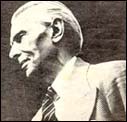'Had Iqbal lived another ten years, he would have championed Pakistan with an ecstatic fanaticism'
 There is, indeed, little doubt that during this last phase Iqbal
was drawn into closer association with Jinnah. True, he was not
greatly impressed by the latter's understanding of Islam, its
ideals and its polity. There is even some reason to believe that
though he gave Jinnah his political support, he maintained an
attitude of reserve towards him. It is pertinent in his connection
to relate an episode towards the end of his life.
There is, indeed, little doubt that during this last phase Iqbal
was drawn into closer association with Jinnah. True, he was not
greatly impressed by the latter's understanding of Islam, its
ideals and its polity. There is even some reason to believe that
though he gave Jinnah his political support, he maintained an
attitude of reserve towards him. It is pertinent in his connection
to relate an episode towards the end of his life.
Iqbal, though he had a controversy over the Qadiani question with Jawaharlal
Nehru -- a controversy in which Iqbal was, incidentally, on much
firmer historical grounds than Nehru -- entertained very warm feelings
for the man who, after all, despite never having accepted the
religion of 'the Book', was his kin. When Nehru was in Lahore,
Iqbal expressed a desire to meet him. In his Discovery of India,
Nehru writes:
"A few months before his death, as he lay on this sickbed, he sent
for me and I gladly obeyed the summons. As I talked to him about
many things I felt that, in spite of differences, how much we
had in common and how easy it would be to get on with him. He
was in a reminiscent mood and he wandered from one subject to another,
and I listened to him, talking little myself. I admired him and
his poetry and it pleased me greatly to feel that he liked me
and had a good opinion of me. A little before I left him he said
to me: 'What is there in common between Jinnah and you? He is
a politician, you are a patriot'.
This attitude of reserve notwithstanding, Iqbal had probably greater
regard and esteem for Jinnah than for most of his Muslim contemporaries.
He may or may not have followed him in everything, but he was
a sufficiently good judge of human character to realise that here
was a man who, whatever his failing and defects, was steadfast
in purpose, possessed an indomitable will, and was above those
petty, opportunistic considerations which dominated the outlook
of the mediocre 'political adventurer' with whom he had to deal
all his life in the Punjab.
He could rely upon Jinnah which he
could not upon other eminent Muslim politicians. Had he lived
longer, the association between these two men would almost certainly
have ripened into firmer bonds of political co-operation.
Finally, there is the movement of events and the pressure of that
movement has to be considered. Iqbal was not, despite all his
claims to the detachment of an intellectual who led 'no party
and followed no leader', impervious to this pressure.
Pakistan was not a practical and realisable objective in 1935, but it had
become an inevitability in 1945. The mood of the Muslim intelligentsia
had changed; and the mood had changed because its circumstances
had changed. During the war years the Muslim middle class had
vastly strengthened its material position; it was better organised;
and this organisational strength and confidence, combined with
certain other external factors and the British patronage, had
placed it in a position to fight for and get its pound of flesh.
Moreover, the predominantly Hindu leadership of the Congress,
with its narrow sectarian outlook its gross ignorance of any but
the British constitutional parallels, and its incredible lack
of imagination and understanding in dealing with the legitimate
demands of the Muslims, had thrown even those Muslim intellectuals
who were by no means enamoured of the Pakistan idea, into the
arms of the Muslim League.
 It is highly doubtful if Iqbal would
have been able to keep a stable judgement and sane outlook during
the years of political insanity which culminated in the division
of India and the tragedy of the Punjab.
It is highly doubtful if Iqbal would
have been able to keep a stable judgement and sane outlook during
the years of political insanity which culminated in the division
of India and the tragedy of the Punjab.
It would have been impossible for him to do so. Iqbal always reflected
the moods of his community; he often anticipated these moods.
The probability, therefore, is that, had Iqbal lived another ten
years, he would have championed Pakistan with an ecstatic fanaticism.
It would have presented itself to him as the very destiny which
he had been striving to create for Muslim India. He would have
seen in it the crowing achievements of his life, the practical
vindication of his philosophy, the power and the glory of his
message, the potential Kingdom of God on earth.
Excerpted from The Ardent Pilgrim, An Introduction to the Life and Works of Mohammed Iqbal by Iqbal Singh, Oxford University Press, 1997, Rs 295, with the publisher's permission. Readers in the US may secure a copy of the book from Oxford University Press Inc USA, 198, Madison Avenue, New York, New York 10016, USA. Tel: 212-726-6000. Fax: 212-726-6440.
|

